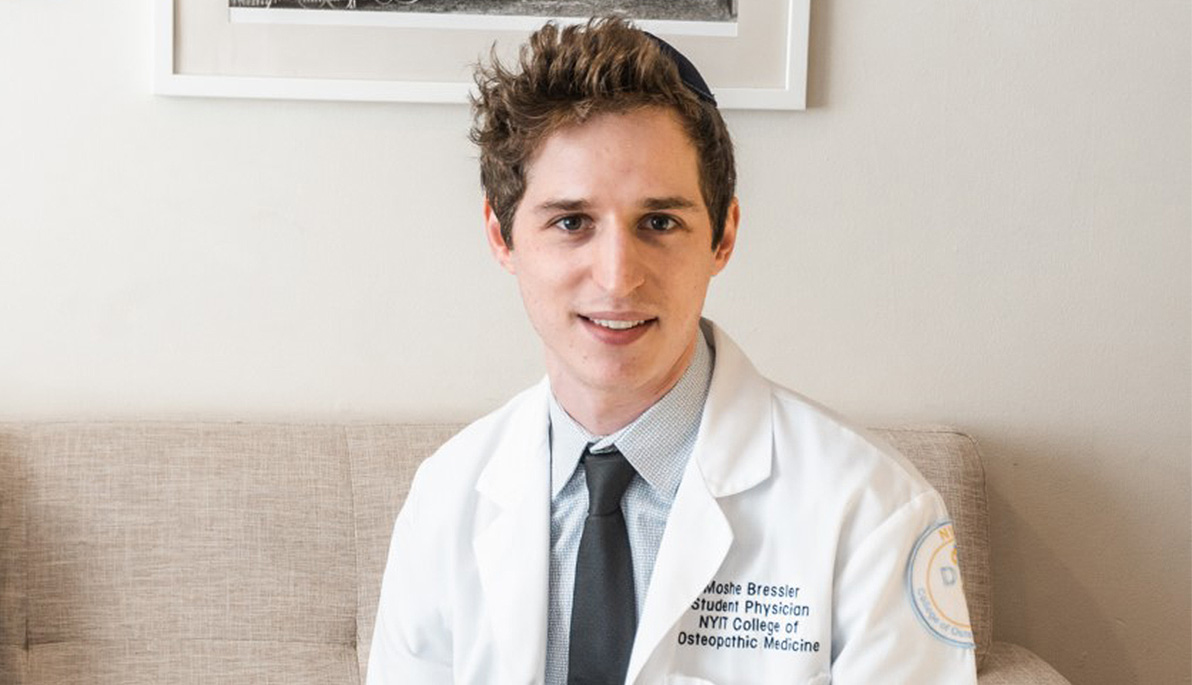
NYITCOM Student Uses Social Media to Address Health Misinformation
March 29, 2021
A new research paper in the journal JMIR Dermatology, co-authored by NYIT College of Osteopathic Medicine student Moshe Bressler, reveals a major concern among dermatologists: how social media plays a dangerous role in spreading misinformation on skin health.
The February 24 paper, which Bressler completed alongside NYU Langone Medical Center Dermatologist John G. Zampella, M.D., addresses the dangerous influence of non-medical experts sharing skincare advice on channels such as Instagram. Posing as skincare experts, these “skinfluencers” often share advice with the intent of persuading consumers to purchase skincare products.
The study, “Risks and Benefits of Using Social Media in Dermatology: Cross-sectional Questionnaire Study,” anonymously surveyed 128 practicing dermatologists and dermatology residents across various regions in the United States and generations. Using an online survey of 36 questions, participants scored their concerns and views on social media, as well as how likely they were to use social media, both in their personal and professional lives.
Out of a total score of 100, indicating the greatest degree of danger, the participants scored the influence of unqualified individuals at a whopping 89. However, 82 percent of respondents still noted that they plan to increase their personal and professional social media use. These findings suggest that many dermatologists still see social media as a valuable platform to educate patients and combat abundant misinformation while also providing a way to build relationships with other physicians and practices.
In addition to these questions, the respondents were asked to score their usage of Facebook, Instagram, LinkedIn, Reddit, Snapchat, Twitter, WhatsApp, and YouTube. Photo-centric Instagram was deemed the most valuable platform, aligning with the very visual nature of dermatology.
The findings also revealed differences in perspectives between generations. Those belonging to Generation X were most concerned about misinformation and, for this reason, least likely to use social media. Meanwhile, Millennials and Baby Boomers were both optimistic about social media and embraced its usage.
Social Media: To Use or Not to Use?
Social media’s impact on medicine particularly intrigued Bressler, who was raised in the ultra-Orthodox Jewish community. Growing up, he did not own a cell phone or use the Internet. Given this, Bressler has long been curious about the implications of social media and how it can influence psychology.
“My favorite class as an undergrad at Brooklyn College was Social Psychology, and it was at Brooklyn College that I began using Facebook to connect with other premed students, promote club events, influence student government elections, begin a tutoring business, and start a cycling team,” he said.
As a medical student, social media has also enabled Bressler to discover a community of like-minded individuals. It was through Instagram that he formed a relationship with Zampanella. They soon found that they both had an interest in studying the impact of social media in dermatology.
“After tossing some ideas back and forth, [it] clicked: instead of asking patients how they interact with their healthcare on social media, why not ask the physician how they interact online? In this regard, the [existing] research was completely lacking, and our study is the first of its kind in dermatology,” said Bressler, who is currently pursuing dermatology residencies to follow his graduation from NYITCOM in May 2021.
Like many of the physicians who responded to the survey, Bressler also plans to use his social media presence to educate others. Some of his recent posts, especially those on WhatsApp, have helped to advocate for COVID-19 immunization.
“While my Instagram is public-facing, I have a much heavier influence on WhatsApp with my hometown community. After sharing photos of myself getting vaccinated for COVID-19 on WhatsApp, many people reached out to me with questions about the safety and efficacy of the shot. One friend thanked me saying, ‘I’ve seen a lot of doctors and nurses getting the COVID vaccine, but you are the first person I know, personally, to get the shot, and I feel much better after hearing your experience.’”
The future physician shows no signs of stopping, seeing his social media presence as an integral part of helping to promote public health awareness and curb the spread of misinformation.
“When misinformation is online, it’s hidden in plain sight,” said Bressler. “As physicians, we need to be proactive in disseminating accurate information—not reactive. If physicians don’t step up to combat misinformation, who will? The answer is already apparent online: people not in medicine.”
More Features

An Alumnus’ Commitment to the Environment
As an energy management graduate from New York Tech’s Vancouver campus, Jasdeep Gulati (M.S. ’22) is highly invested in educating people about environmental and climate sustainability.

Vancouver Faculty Win University-Sponsored Research Awards in New Program
The new Global Impact Research Grant (GIRG) program has been developed to keep Vancouver-based faculty connected to faculty and research projects being conducted on the university’s New York campuses.

Studying Climate Change One Degree at a Time
Junhua Qu (M.S. ’24) began her collegiate journey in Beijing. But, her interest in climate change took her to New York Tech’s Vancouver campus to study energy management.
